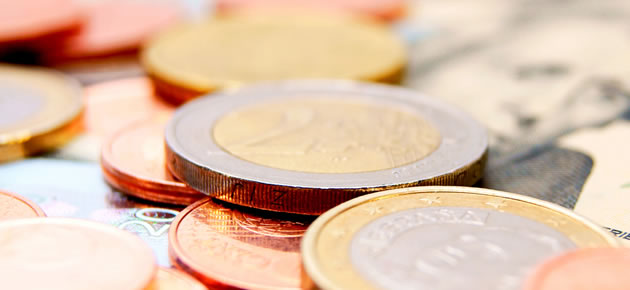Euro to Pound Sterling (EUR/GBP) Exchange Rate Advances Despite Greek Data
Concerns that the Bank of England’s (BoE) quarterly inflation report could shut the door on an interest rate increase occurring in 2015 helped the Euro eke out a modest gain against the Pound on Thursday.
The EUR/GBP exchange rate climbed by 0.2% in spite of Germany’s inflation data for January being negatively adjusted.
It had originally been estimated that the nation’s Consumer Price Index fell by -1.0% on the month and -0.3% on the year. Those numbers have now been cut to -1.1% and -0.4% respectively.
According to one industry expert; ‘The very low level of consumer inflation in Germany and elsewhere in the Eurozone underlines the need for the European Central Bank’s expanded stimulus package that comes into effect from March, adding government bond purchases to covered bond and asset backed securities purchases.’
Industrial production in the Eurozone was also shown to have stagnated rather than increasing as forecast.
As the European session progressed the Euro tumbled against the Pound in response to a comparatively hawkish inflation report from the BoE.
The Euro to Pound Sterling (EUR/GBP) exchange rate was trading in the region of 0.7394 – down 0.35% on the day’s opening levels.
Earlier…
The Euro to Pound Sterling (EUR/GBP) exchange rate brushed fresh multi-year lows as European Finance Ministers gathered to discuss the Greek debt situation.
EUR/GBP Exchange Rate Down 0.3%
After sliding against the Pound yesterday following the publication of better-than-expected economic reports for the UK, the Euro to Pound Sterling (EUR/GBP) exchange rate consolidated and extended declines ahead of a gathering of European Finance Ministers.
The Euro to Pound Sterling (EUR/GBP) exchange rate achieved a high of 0.7428
Yesterday German Finance Minister Wolfgang Schaeuble made it clear that Germany is unwilling to negotiate with Greece regarding the nation’s debt obligations and that the bailout conditions agreed by the previous government must be adhered to.
Greek Finance Minister Yanis Varoufakis said of the situation; ‘If you are not willing to even contemplate the prospect of a rupture, then you don’t really negotiate. Greek debt cannot be repaid in the near future.’
Industry expert Benno Galliker commented; ‘At the moment, it’s still about the Greek story. There will likely be some compromise but investors are waiting until there’s a solution. There are still risks out there for equity investors, but they should be buying on the dips.’
If ministers don’t reach some kind of accord at today’s gathering it will increase the odds of a Greek exit from the Eurozone and put the Euro under even more pressure.
The Pound pushed above 1.35 against its European counterpart this morning after gaining by a further 0.4%.
Euro to Pound (EUR/GBP) Exchange Rate Forecast
While the ongoing discussions regarding the Greek debt situation are likely to be the main cause of Euro movement this week, the common currency may also fluctuate following the publication of several notable economic reports for the Eurozone and its largest economies.
Tomorrow sees the release of Germany’s final Consumer Price Index for January.
The measure of inflation was estimated at -1.0% on the month and -0.3% on the year and the figures are expected to remain unchanged.
The negative reading was Germany’s first for over five years and saw economist Christian Schulz state; ‘Eurozone inflation is likely to stay negative in the first half of the year before base effects and the lower Euro exchange rate could return rates into modestly positive territory. A return to the ECB’s 2% target remains a distant prospect.’
The Euro to Pound Sterling (EUR/GBP) exchange rate fell to a low of 0.7383
If it transpires that Germany moved further into disinflationary territory at the beginning of the year, the Euro may come under pressure.
As Germany’s recent industrial production report fell short of forecasts, the Eurozone’s own industrial production figures for December will also be worth noting as they are likely to print below estimate.
Industrial production in the 19-nation currency bloc is believed to have increased by 0.2% on the month in December (on a seasonally adjusted basis) and to have climbed 0.3% on the year.
Lower figures would be Euro-negative.
Before the close of the week a final flurry of Euro movement could follow the publication of fourth quarter growth data for France, Germany, Italy and the Eurozone as a whole.
Poor data could push the Euro to Pound Sterling (EUR/GBP) exchange rate to fresh lows before the weekend.
Economists have projected that the German economy expanded by a non-seasonally adjusted 1.2% on the year in the fourth quarter while the French economy expanded just 0.3% and the Italian economy contracted by a seasonally adjusted -0.5%.
The Euro to Pound Sterling (EUR/GBP) exchange rate was trending in the region of 0.7401
The Pound Sterling to Euro (GBP/EUR) exchange rate was trending in the region of 1.3233
The Euro to US Dollar (EUR/USD) exchange rate was trending in the region of 1.3505
The US Dollar to Euro (USD/EUR) exchange rate was trending in the region of 0.8833



